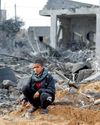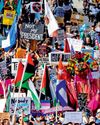
The first, in late July, targeted a parked police car in central Kherson just as Ustenko walked past, throwing him to the ground. The second, in mid-August, hit a drinking water tanker as he queued for supplies, killing the driver. Ustenko was concussed, and came round to see a man lying in a pool of blood.
The third time, in late September, he heard the drone buzzing above and sprinted for shelter under the branches of a cherry tree. He hoped its leaves would hide him but the grenade tumbled through the canopy and landed barely a metre away.
The explosion ripped his left index finger apart. He is left-handed, so at 51 he is learning to write again with his other hand. When he speaks, his sentences sometimes peter out, the impact of multiple concussions, and he struggles to stand because of repeated blast injuries to his back.
Two years into Russia's invasion of Ukraine, civilians living in the frontline city of Kherson are grappling with the new threat from small civilian drones adapted to carry explosives.
On social media, Russian soldiers openly boast that their target is anyone or anything that moves. Since the drones began swarming the city in July, there have been thousands of attacks each month, killing 24 civilians and injuring hundreds more.
"The hunt has started," urged one Telegram post above a satellite image of an ordinary van. "Any black minivan must be destroyed no matter where they are going." They have dropped grenades on buses and people waiting at bus stops, civilians on bikes and queueing for humanitarian aid, or, like Ustenko, just walking home with shopping.
This story is from the October 25, 2024 edition of The Guardian Weekly.
Start your 7-day Magzter GOLD free trial to access thousands of curated premium stories, and 9,000+ magazines and newspapers.
Already a subscriber ? Sign In
This story is from the October 25, 2024 edition of The Guardian Weekly.
Start your 7-day Magzter GOLD free trial to access thousands of curated premium stories, and 9,000+ magazines and newspapers.
Already a subscriber? Sign In

Catharsis Journalist and novelist Omar El Akkad castigates complacent liberal responses and western hypocrisy over the war in Gaza
'Where's the Palestinian Martin Luther King?\" Journalist and novelist Omar El Akkad has heard this question a lot lately, \"the implicit accusation [being] that certain people are incapable of responding to their mistreatment with grace, with patience, with love, and that this incapacity, not any external injustice, is responsible for the misery inflicted upon them\".

The US's former friends need to realise the old global order is over
A resonant phrase during Donald Trump's first administration was the advice to take him \"seriously, but not literally\".

Healthcare workers are protected under international law yet hundreds were detained during the war. Here, some of Gaza's most senior doctors speak out 'No rules': tortured, beaten and humiliated in Israeli detention
Dr Issam Abu Ajwa was in the middle of an emergency procedure at al-Ahli Arab hospital in central Gaza when soldiers came for him.

'Why aren't there Oscars or Baftas for what we do?'
From Matilda to Dear England, choreographer Ellen Kane's work has lit up show after show. It's time this art received proper recognition, she says

Print, clone, repeat
How do you follow an Oscar winner like Parasite? In Bong Joon-ho's latest film, a screwball sci-fi, Robert Pattinson keeps dying and being 'reborn'

Star chamber Pharoah's tomb is find of the century
It was when British archaeologist Dr Piers Litherland saw that the ceiling of the burial chamber was painted blue with yellow stars that he realised he had just discovered the first tomb of an Egyptian pharaoh to be found in more than a century.

Can an extinct tree be brought to life?
Abotanical discovery gives hope for resurrecting Rapa Nui's toromiro tree with 'experimental saplings'

a In London, potent mix of religion and rightwingers
The splendours of the Parthenon, Colosseum and Great Pyramid of Giza were in stark contrast to the utilitarian conference centre in London's docklands, but they were there to make a point.

Inflection point Bolsonaro faces 40 years in jail but holds out for Trump lifeline
At the height of Jair Bolsonaro's haywire presidency, Brazilian activists projected their deepest desire on to the Tower of London, where Guy Fawkes once languished after plotting to blow up parliament and assassinate the king.

Shaking off inertia, civic opposition to Trump's cuts gathers pace
On a bright winter's day last week, a group of protesters fanned out along a palm-tree-lined thoroughfare in the picturesque city of Palm Desert to demand that their Republican congressman stand up to Donald Trump and Elon Musk's slash-and-burn effort to reshape the US government.
